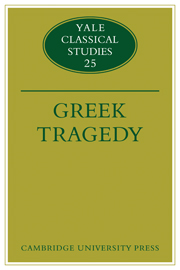Book contents
- Frontmatter
- Contents
- Introduction
- Septem contra Thebas
- The dissembling-speech of Ajax
- The tragic issue in Sophocles' Ajax
- Sophocles' Trachiniae: myth, poetry, and heroic values
- On ‘extra-dramatic’ communication of characters in Euripides
- The infanticide in Euripides' Medea
- The Medea of Euripides
- On the Heraclidae of Euripides
- Euripides' Hippolytus, or virtue rewarded
- Euripides' Heracles
- The first stasimon of Euripides' Electra
- Trojan Women and the Ganymede Ode
- The Rhesus and related matters
Trojan Women and the Ganymede Ode
Published online by Cambridge University Press: 10 January 2011
- Frontmatter
- Contents
- Introduction
- Septem contra Thebas
- The dissembling-speech of Ajax
- The tragic issue in Sophocles' Ajax
- Sophocles' Trachiniae: myth, poetry, and heroic values
- On ‘extra-dramatic’ communication of characters in Euripides
- The infanticide in Euripides' Medea
- The Medea of Euripides
- On the Heraclidae of Euripides
- Euripides' Hippolytus, or virtue rewarded
- Euripides' Heracles
- The first stasimon of Euripides' Electra
- Trojan Women and the Ganymede Ode
- The Rhesus and related matters
Summary
It is usually said, either with admiration or with regret, that in Trojan Women nothing happens. Desmond Conacher gives this opinion an elegant expression when he speaks of the ‘long passion of the Queen and her women’ which is saved from being a ‘mere sequence of disaster’ by a faint, rhythmic pattern of hope revived and then betrayed again. Others have mentioned with less sympathy the play's ‘unrelieved despair’, and Wilamowitz even proposed the deletion of some of Cassandra's lines because he felt they were in opposition to this overriding mood. The play is described as a piece without event; it is said to have but a single tone, and to display little or no structure, a fact which Conacher would relate to its being the last drama in a trilogy.
Now certainly Trojan Women is different from tragedies like Medea or The Bacchae. It does not engineer a single great overturn of fortune, because the downfall of its principals has occurred before the tragedy begins (106–7; 614–15) and all that remains now is for the women to embrace their disasters and savor them as their own. The action of the play thus has a formal likeness to that of Prometheus Vinctus, except that here the single figure of the vanquished giant has been splintered to become three female mortals, to whom a chorus of other women adhere.
- Type
- Chapter
- Information
- Greek Tragedy , pp. 291 - 316Publisher: Cambridge University PressPrint publication year: 1977

